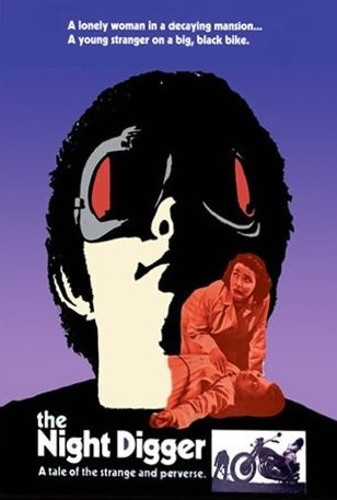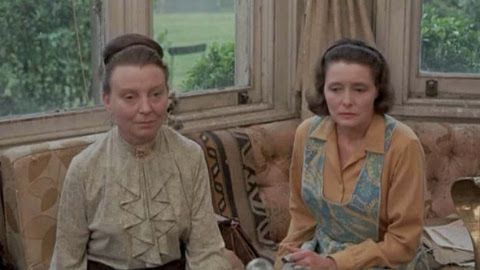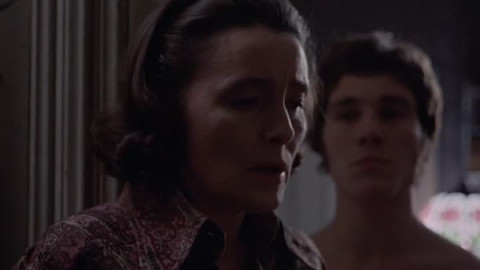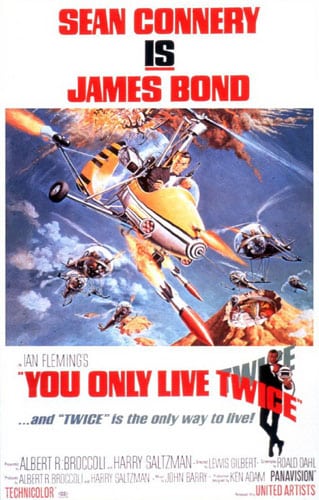The Night Digger (1971)
Directed by: Alastair Reid
Written by: Joy Cowley, Roald Dahl
Starring: Jean Anderson, Nicholas Clay, Pamela Brown, Patricia Neal
UK
AVAILABLE ON REGION 1 DVD
RUNNING TIME: 97 mins
REVIEWED BY: Dr Lenera, Official HCF Critic
In a decaying mansion in Berkshire, middle-aged stroke victim Maura Prince lives a life of drudgery caring for her blind and domineering mother Edith. Into their dysfunctional lives comes a handsome young stranger, riding on a motorbike and looking for work as a handyman. Billy Jarvis soon makes himself indispensable around the house. However, a mysterious killer has been leaving a trail of rape and murder across England, with not a single body turning up.…
Amongst many other things. Psycho had the courage to give us a reasonably sympathetic serial killer, and this idea was developed in Psycho 2 and Psycho 3. One feels that poor old Norman may have been okay if Lila and Mary hadn’t carried out their diabolical plan in the first sequel, and in the second it’s actually painful to see him periodically lapse, put on that dress and wig, and kill again. The Night Digger, a film which is almost obscure by comparison but which I feel deserves to be much better known than it is, is also rather successful at making the viewer feel for a mass murderer, and this one doesn’t just kill, he rapes as well. By rights we should absolutely detest this guy, and there are times when we are frightened of him [which is as it should be], but we also want him to fight his urges and be redeemed by, to use a cliched term, the love of a good woman. This moody suspenser made quite an impression on me many years ago, and watching it again on DVD revealed it to be just as much of interest. It moves at a rather sedate pace, only really gaining some momentum towards the end, and as I type I find this hard to believe considering its subject matter but it almost totally avoids showing any violence, something which may disappoint some viewers. But for me, the rich character study of its unusual heroine, the depressed but compelling atmosphere, and the challenging emotional response it asks of the viewer more than make up for this. It only seriously stumbles in its climax, where even if you rewind the DVD to view the scene again like I did, it’s hard to work out precisely what on earth has happened. It really looks like they cut out a significant chunk of footage which would have made things clearer. I’ll explain later on in this review, though if you don’t want to know the ending skip the first half of the sixth paragraph.
Screenwriter Roald Dahl purchased the rights to Joy Cowley’s 1967 novel Nest in a Falling Tree expressly for his wife Patricia Neal, after her Oscar-nominated return to the screen in The Subject Was Roses failed to yield further job offers. She had suffered from a series of strokes in 1965 which left her having to relearn how to walk and talk. Dahl rewrote the character of Maura as a stroke survivor, and also devised the serial killer plot line which isn’t present in the book. I feel that he was also inspired by both versions of Night Must Fall, which also feature a mother and daughter living together and a psychopathic handyman, and maybe even Le Boucher. Director Alastair Reid was only on his second feature and he only made one more after this one – Something To Hide which has some similarities to The Night Digger – before moving onto TV. Oakley Court in Bray, familiar from some Hammer films, was the outside of Maura and Edith’s house. Other shooting took place at Windsor and Twickenham Film Studios. Composer of the score Bernard Herrmann initially refused to do the film unless the ending was changed, but there was no money to shoot new footage. Disagreements throughout post-production persisted between Dahl, who was unhappy at dialogue being cut or quietened to emphasise the music, and Herrmann. Then Reid, under pressure from MGM, cut the 110 minute film down to 97 minutes. I cannot find out what was cut, but it sure looks to me like some footage is missing from the finale – or maybe Herrmann was right to dislike it so much. The shooting title was The Road Builder and it was shown under that name in the US where MGM, despite the cuts, showed so little interest in the film that it wound up being shelved not long after brief playoffs in limited markets. In the UK it did reasonable business before largely being forgotten.
It’s probably not surprising that having an actual stroke victim play a stroke victim adds a real layer of poignancy, even though I’m certainly not one of these [to my mind very strange] people who think that it’s now wrong for able bodied folk to play disabled characters. Patricia Neal is known for having given a variety of excellent performances in films as diverse as Hud and The Day The Earth Stood Still, but I’d personally rate her one in this movie as her best out of the ones that I’ve seen. She’s well nigh heartbreaking even in the scenes that just introduce her and her situation, letting us know immediately by just the way that she moves that this is a person who’s suffered neglect and abuse for a very long time. She lives in a cavernous mansion, the decaying state of which mirrors her state and life, with an adopted mother Edith who has her at her beck and call, who takes delight in inflicting inconveniences on her, and who just does not want her to have a proper life. As soon as Maura attempts just a bit of assertion, Edith feigns having palpitations, yet despite this Pamela Brown refuses to totally demonise this selfish character who in her own way is as insecure as Maura. Of course a sense of duty play a part, because it was Edith who, 20 years ago, nursed Maura back to health following her stroke, a stroke that she happened to have when she ran away [or should I say escaped] with a man who then abandoned her. But mostly Maura submits to Edith’s dominance simply because she has nothing else in her life. And she does get her own back, like when she tells Edith that she was offered a full time position in the hospital where she works two hours a day – and lets her suffer a bit before informing her that she didn’t take the position. The two women are trapped together in this miserable, claustrophobic excuse for a life, and quite frankly I’d have been okay if the whole film had just featured these two getting at each other continuously and things getting worse. One can imagine an almost Whatever Happened To Baby Jane?-like affair.
But no, into this pressure cooker comes Billy, introduced Night Of The Hunter-style by several cuts on his motorbike separated by other footage. He’s seemingly looking for work. He claims that he comes recommended by the nephew of Mr Bolton the local vicar and tells a bull-twaddle story about caring for his sick mum and her dying when their farmhouse caught fire. Maura isn’t buying this, but Edith takes a shine to him despite him having no reference and not even being able to say what denomination the church he used to go to was. Edith even insists that he have Maura’s bedroom. He proceeds to do loads of work on the house and in the garden, but something’s clearly up when he’s frightened of going to church because he says that he doesn’t like people and will get into trouble. Any ambiguity is soon gone when he notices a pretty girl in church and later breaks into her house, whereupon we learn what that big strap on his bike is for, and also the meaning of the film’s title[s]. I think that Nicholas Clay, who appears in the nude as usual, could have become a major star if more people had seen this film. Despite avoiding histrionics, he’s chilling when in murderous mode, and also very effective in a scene where he comes close to confessing to Maura what he sometimes gets up at night. By now Maura has begin to fall for him – her declaration of “I love you” is a particularly sad and almost pathetic version of this oft-said line – but has also developed a backbone with regard to Edith in moments where you just feel like cheering. It’s really painful watching Maura and Billy get closer and closer. Maura is probably making an even bigger mistake with a guy than when she did 20 years before, but we really want it to work, and for Billy to get sorted even if this hardly seems likely.
The tragic climax understands that a simple look between two people can convey so much more, and is often more cinematic, than lots of dialogue. But it sure looks like they removed a chunk here. SPOILER The couple are on a romantic getaway when Maura suddenly realises that Billy is this notorious killer after all this time. There doesn’t seem to be a cause for this realisation, unless we’re supposed to think that he’s the reason why their neighbour’s dog has gone missing. Leaving things unexplained can be fine in the right film, but here one is just left with a massive and very disappointing “huh”? I wonder if the film finishing a few minutes earlier may have been more effective if they wanted to go down the “ambiguous” route. After all, would anyone really think that there could be a ‘Happily Ever After’? I would have thought that the first sighting of another young girl would cause Billy to get the urge again. SPOILER END. So why does he do this? Two brief flashbacks, sepia and reminiscent of ones in Midnight Cowboy, show a young Billy being unable to perform in bed and being bullied because of this. Of course it’s no real excuse for what he later became, but it’s enough to help us to feel a bit sorry for him, and one senses that there’s still much that we don’t know. I wonder if the decision to not show his killings and rape was not to make him too dislikeable, though cuts had to be made at the behest of the BBFC so maybe we were originally meant to see more. Anyway, the film doesn’t suffer for the absence of this kind of material that we’ve all seen elsewhere in more exploitative flicks, making up for this with some psychological richness. While there certainly are passages of suspense, the tone is generally quite subdued, even inside the great house where many directors would have gone for the Gothic. Reid takes his time, but his filmic style of often having the camera slowly moving around at a distance to the characters creates some decent unease and a few sudden extreme close-ups have an effective jarring effect except in one scene involving Mr. Bolton where it seems to have no point.
Now you’re probably wondering if Dahl’s fabled black humour makes an appearance, and it does during a minor subplot of Edith mistakenly thinking that an acquaintance is going to have a sex change, leading to an odd encounter with a couple where the woman is very much the dominant one while the man virtually cowers in the background. It’s a little amusing, but doesn’t fit in with the tone of the rest of the film [even if you can see a very dark kind of comedy in Maura and Edith’s situation] and didn’t really need to be in it at all. The opposite is true of Herrmann’s sometimes melancholy, sometime edgy, score, which uses a harmonica for Bill, a viola d’amour for Maura, then after a while has the viola d’amour play Billy’s theme as our couple start to form a bond. His unhappiness with the film doesn’t show, though Maura’s theme is partly recycled from Herrmann’s Tender Is The Night score. I will say that the picture quality on the Region 1 DVD isn’t that great even if you forget Blu-ray standards, being very soft indeed, though I can’t see this coming out on Blu-ray somehow – which is a shame. The Night Digger attempts to add some depth and feeling to what were pretty familiar elements even in 1971 – and by and large succeeds even if it never quite becomes as brilliant as it seems like it’s going to. It’s a cult movie that never was and I think that a horror fan fancying a change from gory thrills and jump scares may find it quite rewarding. I bet Tarantino’s fond of it.
Rating: 















Be the first to comment